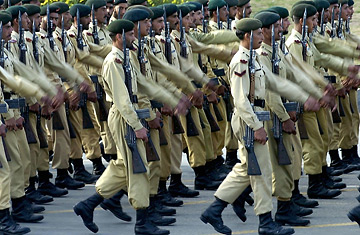
Pakistan army soldiers march in a National Day parade in Islamabad, Pakistan.
Whenever the question of the security of Pakistan's nuclear arsenal comes up, the official U.S. response has been that the weapons are in safe hands. That position is, like the U.S. position on Russian nukes, based on trust — on high-level, personal contacts between military commanders on both sides. For now, Washington can maintain that line about Pakistan because that country's two highest military leaders have close ties to the U.S. or Britain. General Pervez Musharraf, who is also President, was trained in England, and his likely military successor General Ashfaq Pervez Kiyani was trained in the U.S. Soon, however, that trust and fellow-feeling will no longer be available.
That is because of the estrangement between the U.S. and a rising generation of Pakistani officers. For about 10 years, the U.S. Congress barred contacts between American and Pakistani military officials as part of sanctions on Islamabad for pursuing nuclear weapons in the first place. In an ironic boomerang, it is now those officers, ascending to ever more senior ranks, who soon could be overseeing various elements of the Pakistani military, including the security of the several dozen atomic weapons Pakistan is believed to have in its arsenal. Their provincialism, U.S. officials fear, could make them sympathetic to the al-Qaeda and Taliban elements now roiling the country.
Anthony Zinni, a retired four-star Marine general, was in charge of the U.S. Central Command, which oversees Pakistan and 26 other nations, when Musharraf took over as chief of staff of the Pakistani army in 1998. He recalls the very first time he met the Pakistani leader. "He said his No. 1 concern was that over half his officers had not been outside of Pakistan," Zinni told TIME. Zinni, who last met with Musharraf in Pakistan about two months ago, believes that country's nuclear arsenal is secure. "I think the military has a handle on it," he says. But he too believes that the estrangement in the 1990s has led to a re-orienting of sympathies among Pakistan's officers.
For generations, the Pakistani army's top officers had trained in the United States and Great Britain, giving them a worldly sense of military affairs and a perspective on international relations hard to come by inside the country. But such exchanges ended between the U.S. and Pakistan for about a decade after Congress cut off all military cooperation in 1990. "Musharraf was worried that a lot of the junior officers had been isolated from this and might turn inward," Zinni says. "You were beginning to see beards in the officer corps, which may signify more religious conservatism. That's created a bubble of officers who are going to start coming into senior positions that were isolated during the era of sanctions."
Another regional scholar concurs. "There were 10 years in which there was no military-to-military relationship with Pakistan," Marvin Weinbaum, a scholar at the Middle East Insitute told Congress last month. "And that generation of people, who did not have the contacts with us ... we're going to be seeing, very shortly, those people rising to positions of importance... This is an unfortunate consequence of having turned our back on Pakistan in 1990."
Currently, the Pakistani army is conflicted over its orders to battle jihadists, says Husain Haqqani, a former senior Pakistani diplomat and political operative who is now a professor at Boston University. "These large numbers of troops who are virtually surrendering themselves to the insurgents in Waziristan without putting up a fight would not have done so if they were not conflicted within themselves," he told a congressional panel recently. "That conflict comes from a belief system after years of having been told that the jihadists represent a force for good. And now that they are being told to fight them, some of them are not able to make that transition as quickly as General Musharraf was able to make after 9/11 with a phone call from Washington, D.C."
Military cooperation between the U.S. and Pakistan resumed after 9/11, when the U.S. needed Pakistan's assistance to dismantle Osama bin Laden's terror state in Afghanistan. But relations remain frayed between the two nations because of Pakistan's memory of Washington's hot-and-cold attentions. "There's a complete lack of trust going back to after the first Afghan war [against the Soviet Union] — when we left them high and dry with 500,000 refugees," Zinni says. "And then we came rushing toward them after 9/11."
Pentagon officials say they have no idea whether Musharraf's imposition of what is essentially martial law will succeed or fail in stemming the radical Islamist tide. "Sure it works in the short term," one Army officer says. "But if the country is too brittle it could break." Pentagon officials added that the U.S. is reviewing some $300 million in foreign military sales financing for 2008, $32 million for law enforcement and anti-narcotics efforts, and $2 million for military training — the same kinds of program whose scrapping in the 1990s so upset Zinni.
Indeed, Zinni disagrees with moves that would continue to punish Pakistan's military. He argues that the 1990s' sanctions were counterproductive, creating "a lot of bitterness in the ranks" of the Pakistani military. "It's too easy to punish the military for political decisions," Zinni says. "If the U.S. had problems with a country on human rights or other issues, I was always ordered as a combatant commander to punish the country's military. We shoot ourselves in the foot in a security sense when we do that."
